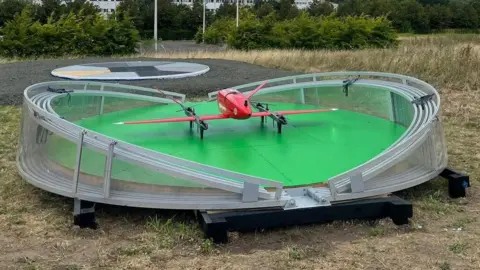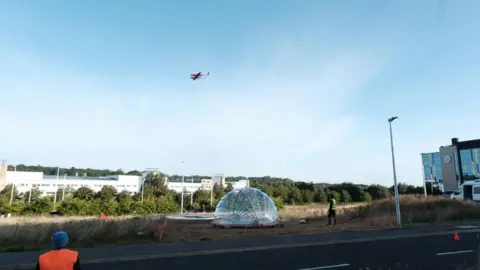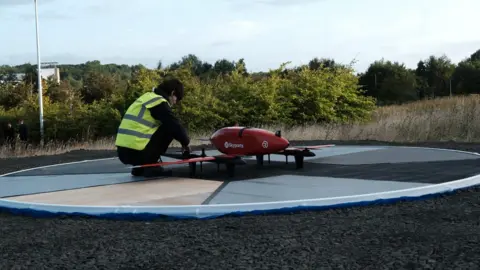Drones fly NHS lab specimens in Scottish first
 Project CAELUS
Project CAELUSNHS lab specimens have been flown by drone for the first time in Scotland between two health boards.
The flight took place between the Edinburgh BioQuarter next to the city's Royal Infirmary and the Borders General Hospital in Melrose.
The trial, involving NHS Lothian and NHS Borders, was part of Project CAELUS - led by AGS Airports in partnership with NHS Scotland.
The aim is to cut the time it takes to deliver the specimens which are used to inform urgent clinical decision-making.
 Project CAELUS
Project CAELUSAt present, it can take several hours for them to make their way between NHS Borders and NHS Lothian.
That could be cut to about 35 minutes by drones making the trip of 30 miles (50km) as the crow flies.
Project CALEUS is working with a range of groups to deliver what would be the first national drone network for transporting medicines, bloods and other medical supplies.
Project director Fiona Smith said: "Our consortium has been working extremely hard to get to this stage and we are delighted we have been able to test this important-use case for the NHS.
"Transporting laboratory specimens by drone could speed up the clinical decision-making, allowing for same-day diagnosis and treatment.
"It is also one of the first times in the UK that there has been a demonstration of beyond the visual line of sight medical drone operations transiting between controlled and uncontrolled airspace."
 Project CAELUS
Project CAELUSShe said it was an "important milestone" and they looked forward to further tests.
Hazel Dempsey, who is the CAELUS NHS Scotland programme lead, added: "Our aim, from an NHS perspective, is to explore opportunities where drone technology could benefit patients and NHS services in urban, remote, rural and island landscapes.
"The NHS is reliant on van logistics that have provided valuable service for decades, however these can take time, travelling hundreds of road miles each day.
"In some parts of Scotland, patients who live in remote and rural locations are dependent on ferry or airline availability.
"This project will enable the NHS to consider if drone technology is viable and able to contribute to improving the health and wellbeing of our population."
